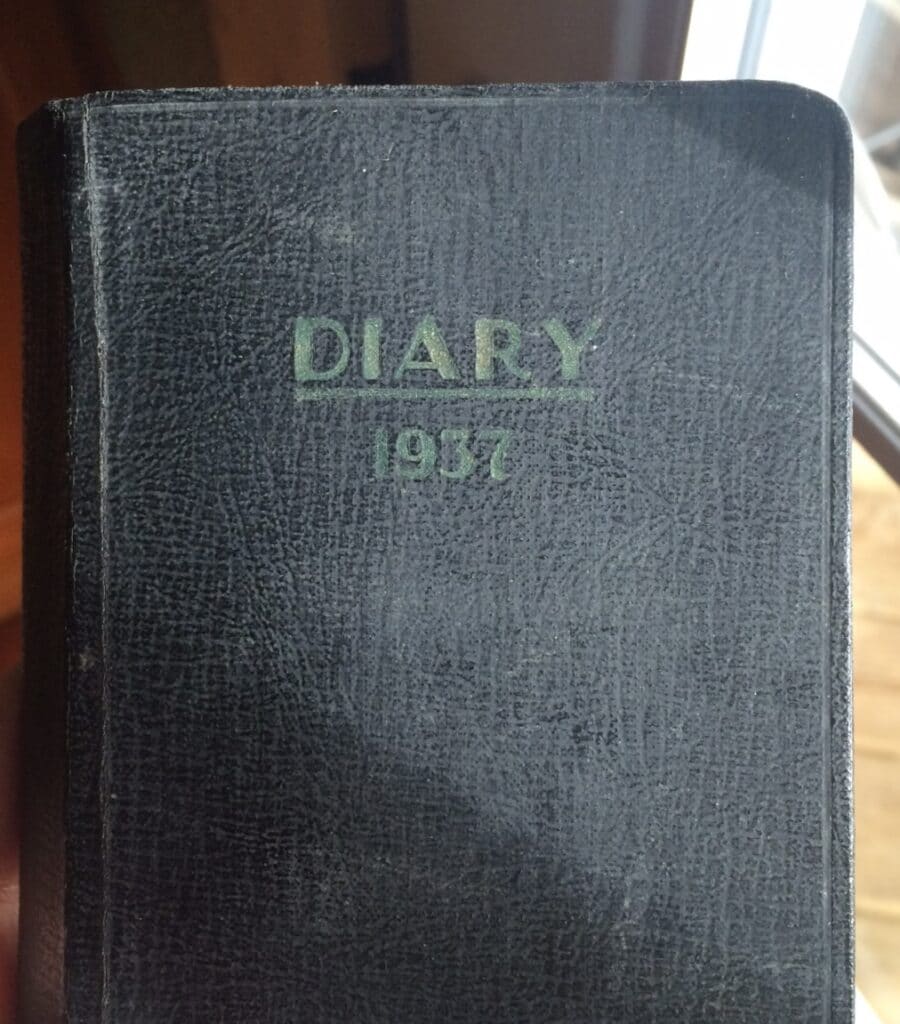Ah, the diary! An empty book just waiting for you to confess all your fears, dreams, secret loathings and lovers!
At least that’s what I thought when I started keeping a diary at age 10. It had a lock and key just to make sure all my secrets were safe. But in reality, I had few secrets. I’ve written before about how completely BORING my diary was when I looked back on it almost 35 years later. I really did think my childhood was a little more interesting than that. Maybe I just hadn’t captured the “real” stuff. Maybe it was easier to write about what I wore and which boy I had a crush on because my parents’ divorce and the strain of living with a new stepparent wasn’t something I could put into words. At least not at age 10.
I recently transcribed and posted on my Unclaimed Ancestors blog the diary that my grandparents kept the first year of their marriage. As a person who knew them only in the post retirement years, it was absolutely charming to read about them as newlyweds. Because they wrote daily, the monotony does tend to build up. But, as a glimpse into ancestors daily lives, it’s a treasure.
I host two diaries on Unclaimed Ancestors and wanted to add more. So, I bought several more off eBay with the intention to transcribe and post them for families. The more diaries I read, the more the question of why people keep a diary resurfaces. And the possible answers are as varied as the people who write them. I kept a diary because it felt like a secret place where I could be me – that was probably something I needed in the turmoil of my parents’ divorce. But if you had just picked it up and read it without knowing me, none of that would come through.
Other diaries are certainly written as memory keepsakes. Long, detailed daily entries – maybe for the author to recount later, to share with others, or to remember a special trip. The diary of Wealthy Hossafous Harp falls into this category. My grandparents, no doubt, kept theirs for their personal use, not to be shared. The family didn’t even know this diary existed until they had both passed away. How often, I wonder, did they look at it? Did they ever feel the need to reconnect with the youthful passion and excitement so evident in their newly wed year?
Recently I started transcribing a diary of a mother of 4 boys from the 1940’s. The family lived outside of Detroit. Her almost daily entries consist mostly of the weather, visits from friends, and how many times she cut her sons’ hair. What was her motivation I wonder? Passing the time? Logging details she felt were important? Her diary tells us voyeurs a LOT about what things cost and how cold Michigan is in the winter. It even details each of her son’s birthdays and illnesses, including a hospital stay. What it does not tell us is how this mother felt about any of these things. There is no wishing, hoping, lamenting, only bare facts laid out. Maybe this is to be expected from a post WWII era writing style; or maybe she was simple a busy mother of four boys!
There’s no right way to keep a diary. No one reason to write down your weekly thoughts or weekly facts. And there are certainly some diaries out there that qualify for that gold standard of: stuff you don’t want anyone else to know about! I don’t know how comfortable I’d be putting some secrets online.
As a genealogy resource, diaries are the equivalent of a crapshoot. You have no idea what you’re going to get. You can be relatively certain of the information that will appear on a death certificate, land grant, and marriage license. But open that diary and there’s no telling. It begs the question of whether we should share what’s in these private pages at all. Certainly this resource deserves at least the same respect given to other sources of data: make sure the sensitive stuff is private until the person is no longer living. In the digital age, where emails, texts, and pictures are open game for the internet – I guess diaries are now too. If you have a secret you don’t want to end up online, don’t write it down!
A personal diary can shed so much light on how people lived. It can add the kind of details to a family story that we genealogist crave. But we don’t want to fall into the trap of believing that the writer was thorough, unbiased, and completely truthful at all times! The reality is we will likely never know why the diary was kept. Because only mundane facts were written down doesn’t mean only mundane things happened. Because the writer states the time her son entered and left the hospital but never describes any worry and angst, doesn’t mean those emotions were not present. It’s like looking at snapshot that’s out of focus. You sort of get what’s going on, but will never see the whole picture.
If you have a family diary that you want to share with others, please let me know. In most cases I can host it completely free on UnclaimedAncestors.com.
